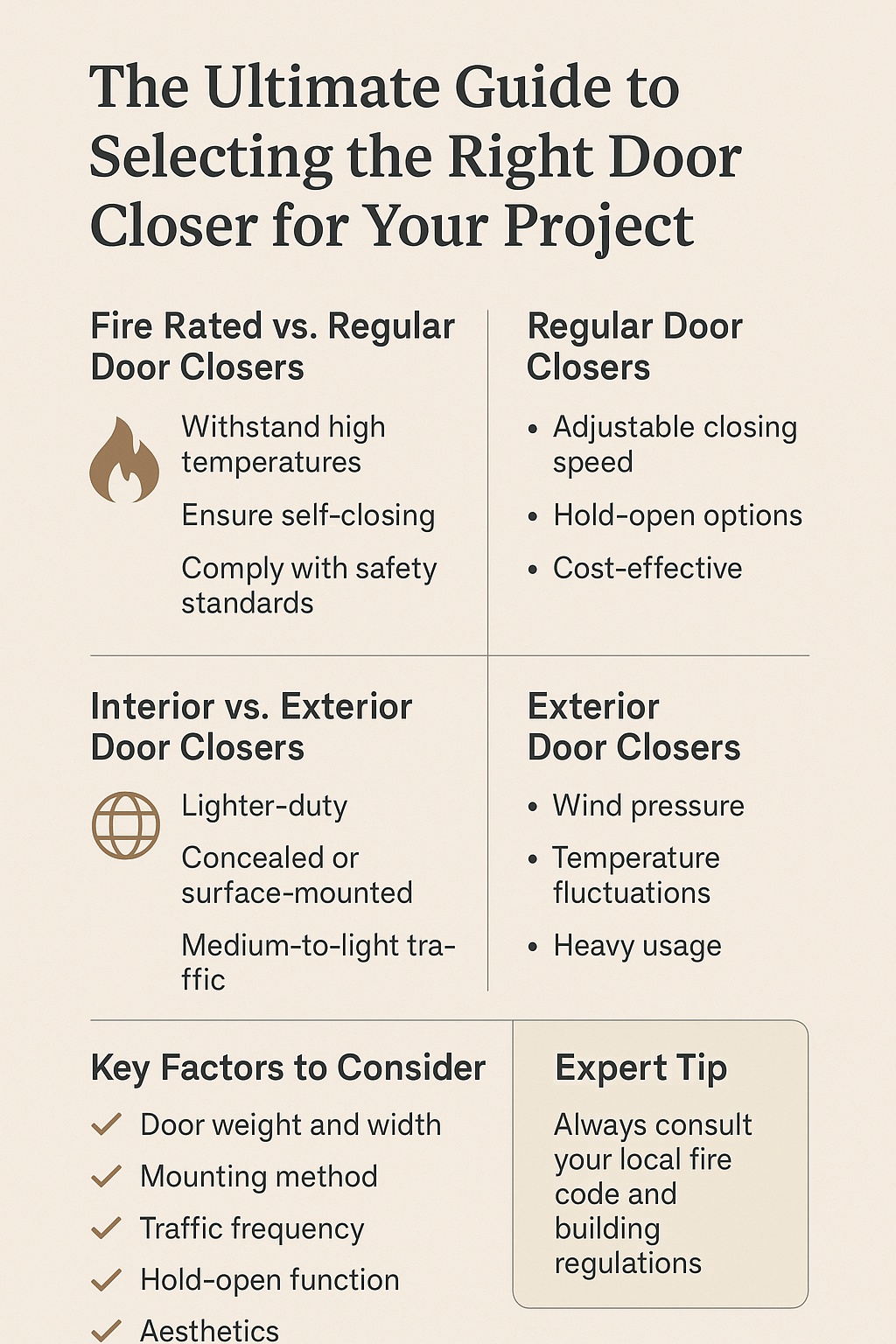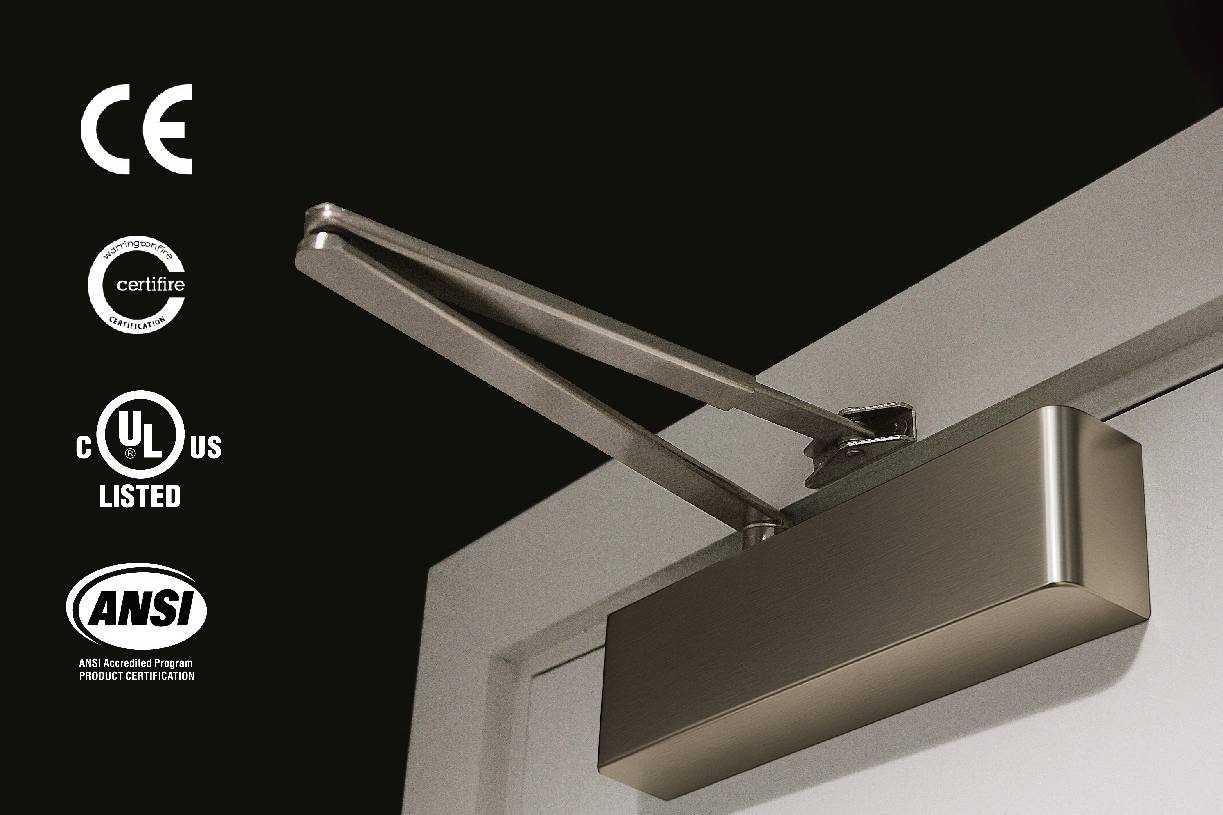“Looking for the best door closer for your project? Discover the key differences between fire-rated and regular door closers, plus expert tips for interior vs. exterior use. A complete guide for architects, builders, and contractors.”
When it comes to door hardware, a door closer is often overlooked—but it plays a crucial role in safety, security, and efficiency. Whether you’re working on a residential renovation, commercial property, or a public facility, selecting the right door closer ensures optimal performance and code compliance.
In this guide, we’ll walk you through the key considerations when choosing a door closer, focusing on fire-rated vs. regular models, and interior vs. exterior use.
🔥 Fire Rated vs. Regular Door Closers
Fire Rated Door Closers are mandatory for fire doors. They are specifically designed to:
-
Withstand high temperatures during a fire
-
Ensure self-closing to prevent the spread of smoke and flames
-
Comply with international safety standards, such as UL or EN1154
If you’re installing a door closer on a fire-rated door (typically in stairwells, corridors, or exits), it must also be fire-certified. Non-compliance could result in legal issues, fines, or safety hazards.
Regular Door Closers, on the other hand, are suitable for non-fire-rated doors. They offer functionality like:
-
Adjustable closing speed
-
Hold-open options
-
Cost-effective performance
They are ideal for office doors, bedroom doors, or internal partitions where fire protection isn’t a requirement.
🌐 Interior vs. Exterior Door Closers
Interior Door Closers are usually used in climate-controlled environments, so they can be:
-
Lighter-duty
-
Concealed or surface-mounted for aesthetics
-
Designed for medium-to-light traffic
Best applications: Hotel rooms, offices, residential interiors
Exterior Door Closers face more challenges, such as:
-
Wind pressure
-
Temperature fluctuations
-
Heavy usage and security demands
Therefore, you need a durable, weather-resistant, and adjustable closer, often with features like:
-
Delayed closing for accessibility
-
Backcheck function to protect against forceful openings
-
Rust-resistant finishes for outdoor exposure
Best applications: Main entrances, exit doors, commercial buildings
✅ Key Factors to Consider
-
Door weight and width – Heavier or wider doors require stronger closers (EN size 3 to 6).
-
Mounting method – Surface-mounted, concealed, or floor-spring types.
-
Traffic frequency – High-traffic areas need heavy-duty models with durable internal components.
-
Hold-open function – Not allowed on fire-rated doors unless electronically controlled.
-
Aesthetics – Consider design and finish options to match your environment.
🛠 Expert Tip
Always consult your local fire code and building regulations before finalizing a door closer. Using the wrong type could compromise safety and result in costly replacements.
💼 Choosing the Right Supplier
A professional door hardware supplier can help you:
-
Analyze your project needs
-
Recommend certified fire-rated or regular models
-
Offer solutions for both interior and exterior applications
-
Ensure reliable after-sales support
At Lichen Hardware, we specialize in a wide range of high-quality door closers, including fire-rated, overhead, concealed, and heavy-duty models, designed to meet both safety standards and aesthetic needs. Whether you’re an architect, contractor, or distributor, we’ll help you find the perfect solution for your project.
Need Help Choosing the Right Door Closer?
Contact our team today for a free consultation or explore our catalog of professional-grade door control products.



